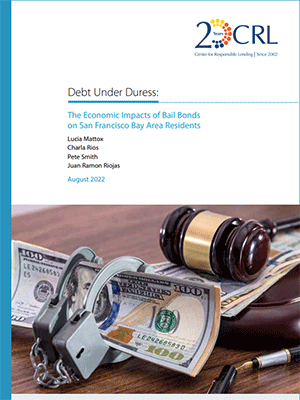Nearly 500,000 people are currently detained pretrial in jails around the United States, in part due to high bail amounts set by the judicial system that individuals cannot afford. That is a six-fold increase in the U. S. pretrial population from the 1970s, when it was closer to 83,000 people detained. Bail is money required in exchange for release from jail while one awaits trial.
With bail costs rising, it has been difficult for individuals and their loved ones to afford paying a court directly for the full bail amount. Instead, they have increasingly turned to for-profit bail bond companies to secure pretrial release, and the industry has proliferated around the country in response, often with little oversight or regulation. In utilizing these companies, families must pay a non-refundable down payment, or premium, of typically 10% of the total bail amount.
Racial disparities manifest in who is held pretrial. Black and Latino individuals make up 62.6% of the country’s pretrial population, compared to 31% of white individuals. Given that Black and Latino people are overrepresented in the U.S. pretrial system and hold less wealth compared to their white counterparts due to structural inequality and discrimination, the ripple effects on their household finances after securing a bail bond can be devastating to families.
In this paper, CRL examines these ripple effects within California, and specifically the San Francisco Bay Area. This report builds on the legacy of previous research and advocacy to explore how the bail bond system’s existence impacts finances and contributes to the racial wealth gap in low-income communities and communities of color. Focusing on the experiences of impacted individuals who have secured pretrial release and are living in Alameda, Contra Costa, and San Francisco Counties, this project sheds light on the impact paying for bail has on household finances as a burdensome consumer debt.
